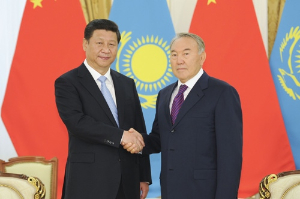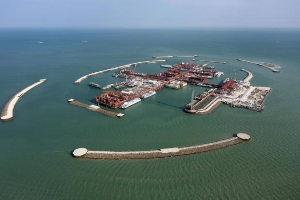Russian and Kazakh Leaders Exchange Worrying Statements
By Arslan Sabyrbekov (09/17/2014 issue of the CACI Analyst)
In a recent interview to the state TV channel Khabar, Kazakhstan’s President Nursultan Nazarbayev spoke about his country’s possible withdrawal from the Eurasian Economic Union. In his words, “Kazakhstan’s independence is our most precious treasure, for which our forefathers fought. We will never surrender our independence and will do everything to protect it. Astana will never join an organization of any form, which presents any threat to its independent statehood.”
Analysts consider the demarche of the Kazakh President a response to recent Russian statements, which have to some extent questioned Kazakhstan’s viability and independence as a state. Speaking at the Seliger youth forum, Russia’s President Vladimir Putin described his Kazakh counterpart as the most experienced politician in the post-Soviet space and gave him credit for creating a state in a territory, where there was none before. In his words, “before Nursultan Nazarbayev, Kazakhstan has never had any statehood.” This statement from the Russian side generated a sharp and bitter reaction among the Kazakhstani public, especially in nationalist and patriot circles. Several virtual protest actions were organized in the country, particularly a flash mob on social media that demanded a history book to be sent to Putin for revision.
Moreover, an earlier statement by the Deputy Speaker of the Russian Duma, the leader of Russia’s Liberal Democratic Party Vladimir Zhirinovsky, created a highly negative backdrop for President Putin’s later remarks. In his usual undiplomatic manner, Zhirinovsky said that after settling the Ukrainian crisis, Moscow should pay attention to the developments in Kazakhstan, where in his opinion, “anti-Russian sentiments are also on the rise.” Obviously, Zhirinovsky's statement come as no surprise to many. His demand last year that in return for its debts, Kyrgyzstan should give its Issyk-Kul Lake to Moscow, earned him a persona non grata status in that country.
The exchange of statements between the two Presidents has given rise to varying comments and assessments. Many were quick to make declarations about the big rift between Putin and Nazarbayev and the unexpected crisis in the Eurasian Economic Union (EEU). However, according to Almaty-based political analyst Dosym Satpaev, these implications are exaggerated. This is not the first time that Nazarbayev has made such remarks. In one of his earlier meetings with the country’s intellectual circles, the Kazakh President described the EEU as an exclusively economic project and said that if doubts arise, Astana will leave the organization at any time it deems necessary. Earlier, President Nazarbayev has also vetoed the creation of a legislative body within the EEU, the function of which obviously goes beyond mere economic integration.
The Moscow-based Central Asia expert Arkadyi Dubnov believes that Putin’s Seliger remarks were interpreted by Kazakhstan’s leadership in light of the developments in Ukraine. Kazakhstan, along with Ukraine, are parties to the 1994 Budapest memorandum. Both countries declined to maintain their nuclear arsenals in exchange for guarantees of territorial integrity. At that time, Moscow appeared as the major international guarantor and has in breach of the aforementioned memorandum annexed Crimea, claiming that no guarantees were given to the new political leadership in Kiev. According to Dubnov, Kazakhstan’s political leadership might have interpreted Putin’s and Zhirinovsky’s statements along the same lines, namely the possibility of a “Crimean scenario” in northern Kazakhstan with its significant Russian minority, if Astana obtains a new, nationalistic political leadership that disregards the Kremlin’s interests.
Indeed, there are many unknowns in this story and one can only speculate about the real logic behind the statements. It remains unclear what really prompted President Putin to make this claim. One can also simply interpret his statement as an effort to emphasize the role of his Kazakh counterpart, who has also been awarded the lifelong title “leader of the nation,” for founding modern Kazakhstan. Astana’s statement is also unlikely to have implications beyond the declaratory level, since Nazarbayev, as President Putin also stated at the youth forum, “is himself the chief initiator behind the creation of the Eurasian Economic Union in its current form.”
The author writes in his personal capacity. The views expressed are his own and do not represent the views of the organization for which he works.
How Real is the Jihadi Threat to Kazakhstan?
By John C.K. Daly (09/17/2014 issue of the CACI Analyst)
In the 23 years since the collapse of the USSR, Central Asia’s interest in its Islamic heritage has grown, with many mosques opening and increasing numbers of Central Asians making the haj. This interest has coincided with militant unrest roiling the Muslin world, from the Maghreb to Xinjiang, leaving Central Asian governments concerned whether radicals, particularly from neighboring Afghanistan, may seek to raise the banner of jihad in their countries. In mid-August, Kazakh FSB officers detained four men in Pavlodar in northeastern Kazakhstan, ranging in age from 20 to 46, who called themselves Salafis. The quartet was subsequently charged with promoting terrorism and extremism under Chapter 9, Article 233 of the Criminal Code of the Republic.

Shanghai Summit Marks Deepening China-Kazakhstan Economic Ties
By Richard Weitz (06/04/2014 issue of the CACI Analyst)
The recent signing of the Eurasian Union Treaty between Russia and several other former Soviet republics, combined with Russian actions in Ukraine and the massive Sino-Russian gas deal finalized during Russian President Vladimir Putin’s recent visit to China, risks obscuring the continuing growth of Beijing’s influence in Central Asia, especially with Kazakhstan. When President Nursultan Nazarbayev conducted a state visit to China from May 19 to 22, he met with President Xi Jinping for the seventh time in less than a year. Although grassroots ties remain weak, energy and other economic ties between the two countries are booming.

Kazakhstan's Kashagan Oil Fields Faces Problems and Soaring Costs
By John C.K. Daly (05/21/2014 issue of the CACI Analyst)
In the past two decades since the collapse of the Soviet Union, Kazakhstan has become a major oil producer. In 2013, Kazakhstan’s oil production surged to roughly 1.64 million barrels per day. A key element in Kazakhstan’s continued growth in oil exports will be the further development of its giant onshore Tengiz and Karachaganak fields and the coming online of its massive Caspian offshore Kashagan fields, along with the development of additional export capacity. But while Tengiz and Karachaganak are already up and running, Kashagan’s development has been far more troubled, and the difficulties in bringing it online persist.






